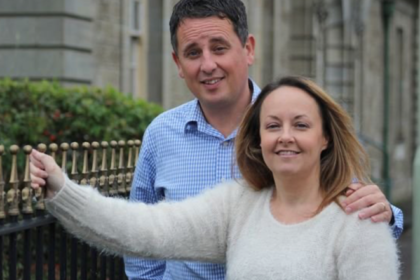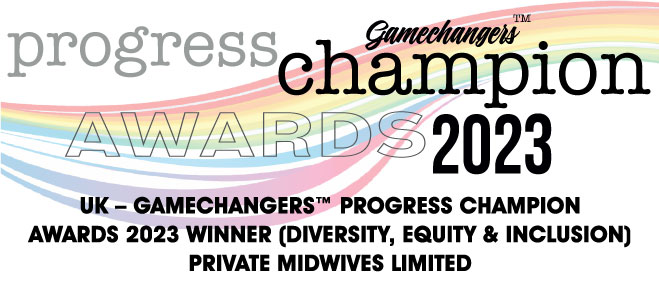
We have all heard about new mums and “baby blues” and in more extreme cases, postnatal depression, but what about new dads? Can dads get postnatal depression too? In this blog, leading campaigner for dads mental health, Mark Williams, talks about postnatal mental health for new dads.
Can Dads Get Postnatal Depression?
Yes, Fathers can suffer anxiety and depression during the perinatal period. The perinatal period is the time starting with the antenatal period and ending the first year after the baby is born, with some services now looking at two years.
The research tells us that one in ten fathers are affected but, as many fathers are now asked about their mental health during the perinatal period, our greater understanding suggests the figures to be much higher. There is also crossover, with many dads suffering from postnatal post-traumatic stress disorder which is an anxiety disorder caused by either witnessing or experiencing a traumatic birth.
Many fathers don’t seek help and sometimes never get to root of the problem, which can lead to the issues manifesting into other problems if not diagnosed and treated.
Is Postnatal Depression Caused by Hormones?
Research shows that there are hormonal changes in fathers. Some studies have suggested that becoming a father can lower a man’s testosterone, resulting in an increased likelihood of releasing key reward and bonding hormones, namely oxytocin and dopamine, when interacting with his child.
But the bigger picture includes many other things like lack of sleep, money worries, relationships changes, feelings of isolation and loneliness, and of being unable to do the things that you used to do before the baby comes along. Also, we must remember that many people have suffered with their mental health before becoming a parents and the many thoughts that mums often have with postnatal depression, dads can also experience.
Signs of Postnatal Depression in Men?
Personality changes in your partner may be a factor, you may feel that he is over working, using alcohol or drugs, avoiding situations he used to enjoy, and showing feelings of anger that weren’t present during the antenatal or postnatal period.
Sometimes dads may not want to talk about it and that could be a sign that they feel distress from the situation and are worried that it may affect, for example, his career, or most importantly his relationship with you.
You know your partner better than anyone and it is a good idea to speak to health professionals, if they seem dismissive it may be advisable to get another opinion. Don’t forget that it’s very important that you look after yourself as well when things are hard
Why Don’t Men Talk About Their Feelings?
Ita a big myth that men don’t talk, they do when they feel they are in safe place and that they won’t be judged. The important part of your relationship is good communication with your partner, it is an important way to feel calmer and more confident about your parenting as well.
Many fathers like me didn’t share their feelings with their loved ones when they were struggling as they didn’t want to burden them. They found it even harder if their partners were struggling as they didn’t want to take the attention away from them.
As soon as I started talking it felt great and a big baggage left me. I became a keynote speaker on the subject because I found more men would talk about what I was going through too.
How to Help New Dads Who May Have Postnatal Depression?
Every father can be different, but it may be worth showing him some of the blogs or videos on perinatal mental health and fathers. There is much more awareness out there now on father’s mental health including podcasts, films and books on the subject. Sit down together and have a conversation around your concerns and how he is feeling.
It is also very important that family and friends understand that fathers can struggle during this difficult time. There is no such thing as a perfect parent. It’s ok not to be ok. The people who judge have often not been educated about this area of mental health.
As mentioned, you do have to look after your own mental health as well.
I Had a Difficult Birth, Can Dad be Affected as Well?
Firstly, I hope you’re ok now and have been able to access with the right support.
Yes, your partner can be affected, it’s one of biggest things that I have encountered, there is nothing worse than thinking your wife and baby may die in that situation. The feeling of helplessness for the one you love can be extremely upsetting and the experience is likely to have been very traumatic for your partner.
Dads should seek professional help from your GP, Midwife or other health professional if you feel the birth experience has affected your partner personally and continues to affect their (and your) daily life.
How Does Postnatal Depression Affect the Baby?
Fathers play an important role in a child’s development and can affect a child’s social competence, performance in school and emotion regulation.
Fathers can also affect a child’s wellbeing indirectly. A supportive relationship between parents is linked to better self-regulation in a child.
Fathers are not just helpers for mothers but are important to children in their own right. For example, children with sensitive and supportive fathers have higher levels of social competence and better peer relationships.
When fathers are depressed, they are less likely to read, sing dance and play with their babies. The research suggests that they are also less likely to follow good health guidelines. Don’t worry if he’s taking a bit longer to change the nappy as long as the baby is safe, it’s the interaction and being included is important.
My Partner is not Bonding with our Baby, Could it be Postnatal Depression?
Tell him not to feel guilty if he isn’t bonding with your baby right from the start. Remember that the process can take time. As you both care for your new baby, you may find that attachment grows.
We know that skin-to-skin has an important part to play. Baby massage is a great activity as, like mums, it calms and relaxes both dad and baby. Also, there are so many benefits in creating that secure attachment.
It’s important to start talking to babies as early as you can. This gets babies used to hearing your voice and responding, even before they can form words.
I found the things I enjoyed with my son helped, like dancing to music with him in his baby sling, also known as kangaroo care.
Where Can Men Go for Support with Postnatal Mental Health Issues?
If your partner is going through anxiety and depression, it is important to talk to the perinatal mental health teams in your area. Doctors and Midwives can signpost where to speak to health professionals that have the highest knowledge in this area of expertise.
Some dads may feel lonely and isolated and, the chances are, a lot of new dads and soon-to-be dads have similar hopes and fears to you. By meeting other dads, you’ll be able to share your experiences and help each other out.
It important that you make time for yourself in your relationship and for a few hours a week take about yourselves and try to do something which was the reason you got together in the first place.
You and Your Wife Suffered with Anxiety and Depression – How is Everything Now?
Life is great and, of course, it brings its challenges; but we are more aware of that now and we have learned that early prevention is key to a quicker the recovery. My wife Michelle works for a mental health charity and is a youth worker and we have just celebrated being together for over 26 years.
My son, Ethan, is just amazing as well. He was more educated about mental health at fifteen than I was at thirty years of age. At eighteen he is working and very sociable, and while we enjoy going to football and music events together. He has so much empathy and understanding of mental health.
Parenthood is the best journey I have ever been on in my life, but also the hardest during the perinatal period. Enjoy the moments and enjoy the memories that bring you joy.
Summary
- Fathers can get postnatal depression. While most research has been conducted solely with fathers, non-biological co-parents can also experience postnatal depression.
- Postnatal depression can often go unnoticed or undiagnosed in partners as the focus is on mum and baby after the birth.
- Partners are just as eligible for and deserving of help and support as the baby’s birth mother. If you think you may be experiencing postnatal mental health concerns, please discuss this with your midwife/GP/health visitor or one of the recognised charities.
- Regardless of which parent is experiencing postnatal depression, it can have an impact on the couples’ relationship and their emotional approach to their baby.
- Affected individuals are often less inclined to play with the baby and may have trouble bonding.
- All of this is more impactful if both partners are experiencing perinatal mental health issues.
Take a look at this video by the author Mark Williams on the importance of new fathers mental health:
If you would like to find out more about postnatal services click here
 LANGUAGE
LANGUAGE





You must be logged in to post a comment.